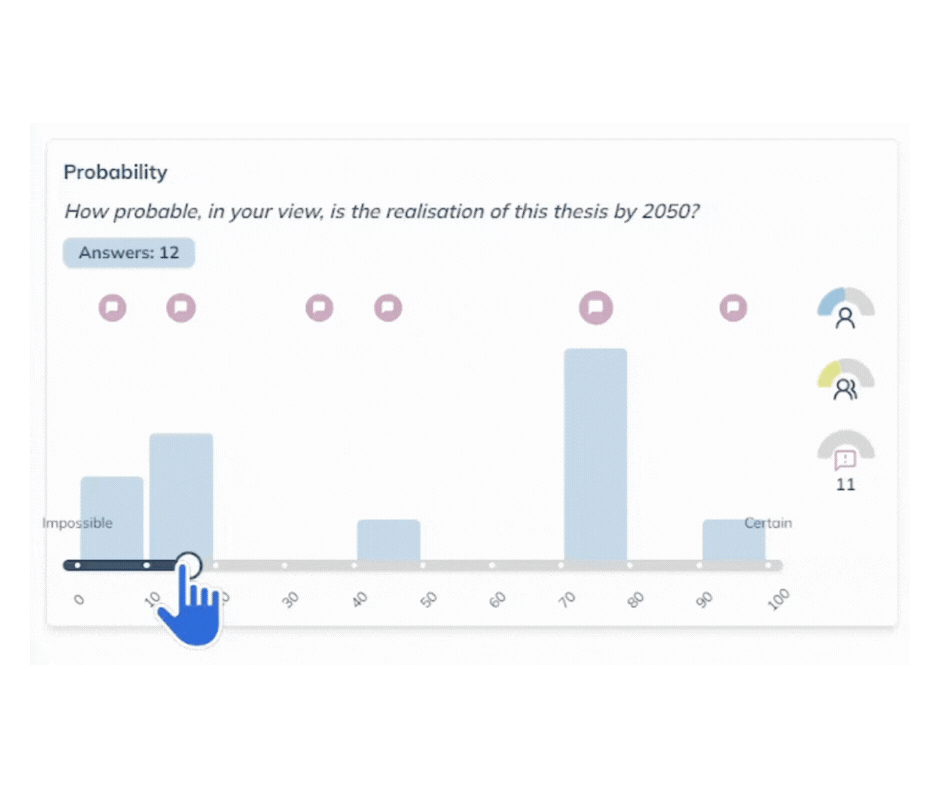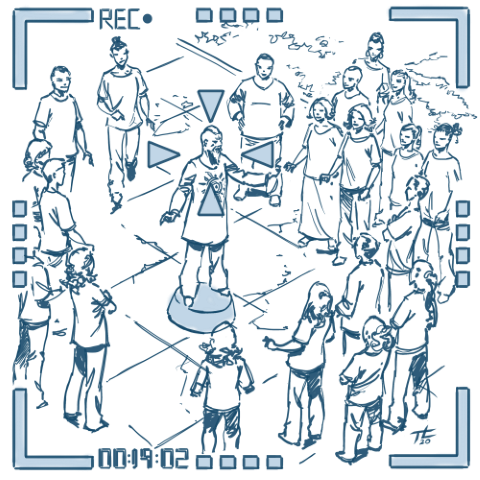Beyond participation
Fostering deep engagement in Delphi studies

The Delphi method is renowned for its unique ability to structure expert dialogue and synthesize collective intelligence. However, realizing its full potential hinges entirely on the active, thoughtful, and sustained engagement of the expert panel. Whether conducting a classic multi-round study or a dynamic Real-Time Delphi (RTD), keeping participants genuinely involved throughout the process is often challenging. Initial enthusiasm can fade, competing priorities can intrude, and if the experience feels tedious or unrewarding, participants may drop out or resort to superficial responses. This article explores practical strategies, and crucially, the transformative role of modern platforms in moving beyond mere participation to foster the deep engagement needed for truly insightful Delphi results.

Why deep engagement matters (more than just participation)
Low participation or high dropout rates are obvious problems, potentially biasing results. But the issue runs deeper. Even participants who technically “complete” the study might disengage intellectually if the process is frustrating or uninspiring. Consequences include:
![]() Shallow insights: Participants may provide ratings but offer minimal or generic justifications if exploring others’ reasoning is difficult or time-consuming.
Shallow insights: Participants may provide ratings but offer minimal or generic justifications if exploring others’ reasoning is difficult or time-consuming.
![]() Lack of learning and opinion revision: The core Delphi mechanism of refining views based on peer arguments breaks down if participants aren’t motivated or enabled to engage deeply with the feedback.
Lack of learning and opinion revision: The core Delphi mechanism of refining views based on peer arguments breaks down if participants aren’t motivated or enabled to engage deeply with the feedback.
![]() Missed opportunities for synergy: Genuine breakthroughs often come from the interplay of diverse perspectives; superficial engagement prevents this creative synthesis.
Missed opportunities for synergy: Genuine breakthroughs often come from the interplay of diverse perspectives; superficial engagement prevents this creative synthesis.
![]() Wasted expertise: You’ve assembled valuable minds; ensuring they are fully utilized requires more than just collecting their initial opinions.
Wasted expertise: You’ve assembled valuable minds; ensuring they are fully utilized requires more than just collecting their initial opinions.
Therefore, maximizing meaningful engagement – active participation coupled with intellectual investment in the collective learning process – is essential for quality Delphi outcomes.

Strategies for engagement: Setting the stage
Thoughtful preparation significantly impacts engagement:
![]() Clear communication and value proposition: Clearly articulate the study’s purpose, potential impact, time commitment, the process of interaction and learning, and why their specific expertise is crucial. Help them see the value in dedicating their time.
Clear communication and value proposition: Clearly articulate the study’s purpose, potential impact, time commitment, the process of interaction and learning, and why their specific expertise is crucial. Help them see the value in dedicating their time.
![]() Relevant expert selection: Ensure participants’ expertise genuinely aligns with the study questions. Passion and relevance fuel engagement. (See our article on selecting experts: Expert overconfidence: Addressing the ‘hedgehog’ problem in Delphi panels).
Relevant expert selection: Ensure participants’ expertise genuinely aligns with the study questions. Passion and relevance fuel engagement. (See our article on selecting experts: Expert overconfidence: Addressing the ‘hedgehog’ problem in Delphi panels).
![]() Thoughtful questionnaire design: Respect participants’ cognitive load. Keep questionnaires focused and concise. Avoid overcomplication or question types that make providing clear reasoning difficult (see article Delphi pitfalls: Avoid these 16 common mistakes for better results). Less is often more.
Thoughtful questionnaire design: Respect participants’ cognitive load. Keep questionnaires focused and concise. Avoid overcomplication or question types that make providing clear reasoning difficult (see article Delphi pitfalls: Avoid these 16 common mistakes for better results). Less is often more.

Strategies for engagement: Facilitating the learning process
During the study, focus shifts to fostering a stimulating intellectual environment:
![]() Meaningful feedback (focus on reasoning): Whether summarized by a facilitator (MRD) or displayed by a platform (RTD), feedback must prioritize easy access to the arguments behind the numbers. Simply showing statistics is insufficient.
Meaningful feedback (focus on reasoning): Whether summarized by a facilitator (MRD) or displayed by a platform (RTD), feedback must prioritize easy access to the arguments behind the numbers. Simply showing statistics is insufficient.
![]() Highlighting key developments: Drawing attention to new comments, counter-arguments, areas of persistent disagreement or divergence from the group keeps the process intellectually dynamic.
Highlighting key developments: Drawing attention to new comments, counter-arguments, areas of persistent disagreement or divergence from the group keeps the process intellectually dynamic.
![]() Demonstrating progress and impact: Let the panel see how their collective input is evolving – make it visible if a user has changed their assessment since they posted a certain justification. Visibility of the evolution of thought provides invaluable insights for the participants and organisers alike. Also, don’t let participants overwrite their previous justifications – if they can freely discuss, ask clarifying questions, and build upon each other’s reasoning, a much richer and more dynamic exchange of ideas can be fostered.
Demonstrating progress and impact: Let the panel see how their collective input is evolving – make it visible if a user has changed their assessment since they posted a certain justification. Visibility of the evolution of thought provides invaluable insights for the participants and organisers alike. Also, don’t let participants overwrite their previous justifications – if they can freely discuss, ask clarifying questions, and build upon each other’s reasoning, a much richer and more dynamic exchange of ideas can be fostered.
![]() Leverage automated, personalized notifications: Generic email reminders can feel like spam. Far more effective are automated digest emails, customized for each participant, that highlight relevant activity since their last visit. Utilize platforms that can automatically notify participants if, for example, someone replied to their comment, the group consensus on an item they rated has shifted significantly (perhaps leaving their view as an outlier), or a substantial number of new justifications have been added to a specific topic since a user’s last visit. These targeted prompts are much more likely to draw participants back in thoughtfully, signaling that the dialogue is active and their specific input or perspective might be newly relevant, without overwhelming them with constant generic updates. This requires sophisticated platform capabilities but significantly boosts meaningful re-engagement.
Leverage automated, personalized notifications: Generic email reminders can feel like spam. Far more effective are automated digest emails, customized for each participant, that highlight relevant activity since their last visit. Utilize platforms that can automatically notify participants if, for example, someone replied to their comment, the group consensus on an item they rated has shifted significantly (perhaps leaving their view as an outlier), or a substantial number of new justifications have been added to a specific topic since a user’s last visit. These targeted prompts are much more likely to draw participants back in thoughtfully, signaling that the dialogue is active and their specific input or perspective might be newly relevant, without overwhelming them with constant generic updates. This requires sophisticated platform capabilities but significantly boosts meaningful re-engagement.
![]() Responsive facilitation: Be available to clarify, troubleshoot, and ensure the process runs smoothly.
Responsive facilitation: Be available to clarify, troubleshoot, and ensure the process runs smoothly.

The platform’s role: Enabling deep engagement and mutual learning
In modern Delphi, particularly RTD, the digital platform shouldn’t be just a data collection tool; it is the environment where collective learning happens (or fails to happen). There’s a vast difference between merely allowing participants to see comments and actively facilitating engagement with them:
![]() User experience (UX) is paramount: As stated before, a clunky interface kills engagement. An intuitive, effortless platform experience (like 4CF Halnyx 2.0‘s design focus) removes friction and encourages participants to spend their cognitive energy on the substance, not on fighting the tool.
User experience (UX) is paramount: As stated before, a clunky interface kills engagement. An intuitive, effortless platform experience (like 4CF Halnyx 2.0‘s design focus) removes friction and encourages participants to spend their cognitive energy on the substance, not on fighting the tool.
![]() Making reasoning accessible and digestible: This is fundamental. Basic platforms might just show long, unsorted comment lists. Next-generation platforms provide powerful tools to filter, sort, link, and visualize justifications, making it easy for participants to quickly grasp why opinions differ and learn from peer insights. This transforms participation from a chore into a valuable learning opportunity.
Making reasoning accessible and digestible: This is fundamental. Basic platforms might just show long, unsorted comment lists. Next-generation platforms provide powerful tools to filter, sort, link, and visualize justifications, making it easy for participants to quickly grasp why opinions differ and learn from peer insights. This transforms participation from a chore into a valuable learning opportunity.
![]() Actively facilitating interaction: True engagement involves dialogue. Modern platforms move beyond passive comment viewing by incorporating features like threaded discussions, comment rating/tagging, highlighting changed opinions or sorting by “opposing viewpoints”, fostering a more dynamic, interactive learning environment where ideas can be built upon and refined collectively.
Actively facilitating interaction: True engagement involves dialogue. Modern platforms move beyond passive comment viewing by incorporating features like threaded discussions, comment rating/tagging, highlighting changed opinions or sorting by “opposing viewpoints”, fostering a more dynamic, interactive learning environment where ideas can be built upon and refined collectively.
![]() Intelligent guidance: Saving participants time by highlighting key disagreements, novel points, opposing viewpoints or shifts in opinion helps them focus efficiently and encourages re-engagement with the most stimulating aspects of the dialogue.
Intelligent guidance: Saving participants time by highlighting key disagreements, novel points, opposing viewpoints or shifts in opinion helps them focus efficiently and encourages re-engagement with the most stimulating aspects of the dialogue.
![]() Visible learning: Showing how opinions evolve in response to arguments makes the learning process transparent and underscores the value of thoughtful participation and openness to revision.
Visible learning: Showing how opinions evolve in response to arguments makes the learning process transparent and underscores the value of thoughtful participation and openness to revision.
![]() The critical difference: It’s the difference between a platform where changing your assessment after reading comments is theoretically possible versus a platform where the design actively encourages and makes it easy to explore diverse reasoning, reflect, interact, and revise views based on learning from others.
The critical difference: It’s the difference between a platform where changing your assessment after reading comments is theoretically possible versus a platform where the design actively encourages and makes it easy to explore diverse reasoning, reflect, interact, and revise views based on learning from others.

Engaged minds yield deeper insights
Keeping your Delphi panel active is important, but fostering deep intellectual engagement is transformative. Success requires clear communication, respect for participants’ time, sound methodology, and, crucially in today’s environment, choosing the right tools. Modern Real-Time Delphi platforms designed with user experience and active facilitation of mutual learning at their core can dramatically enhance engagement. By prioritizing platforms like 4CF Halnyx 2.0 that make exploring reasoning effortless, foster interaction, and make the learning process itself visible and rewarding, you move beyond simple participation metrics. You cultivate an environment where collective intelligence truly flourishes, leading to the richer, more robust insights and better-informed strategic decisions, that are the hallmark of a well-executed Delphi study.

Experience the next generation of Delphi
4CF Halnyx 2.0 provides the intuitive, powerful, and insight-focused platform needed to conduct effective Real-Time Delphi studies that deliver meaningful results.
Interested in Delphi and RTD? Explore our expert series:
4CF Delphi Expert Series offers comprehensive insights, drawing on extensive experience, covering everything from the fundamentals to advanced applications and the crucial role of next-generation platforms. Whether you're new to Delphi or an experienced practitioner, explore these articles to deepen your knowledge and enhance your results.






Explored these? Discover even more in our full Delphi series
Interested in Delphi and RTD? Explore our expert series:
4CF Delphi Expert Series offers comprehensive insights, drawing on extensive experience, covering everything from the fundamentals to advanced applications and the crucial role of next-generation platforms. Whether you're new to Delphi or an experienced practitioner, explore these articles to deepen your knowledge and enhance your results.
Explored these? Discover even more in our full Delphi series
Stay updated! Subscribe to our newsletter:
By subscribing to our newsletter, you consent to the processing of the provided data. The data controller is 4CF Sp. z o.o., its registered office is located in Warsaw, 10/14 Trzech Krzyży Square, postal code: 00-499.
We process your data solely for the purpose of sending information about 4CF Sp. z o.o. and its activities via e-mail. Your data will be processed until your consent is revoked through a link that will be included in each newsletter. The withdrawal of consent shall not affect the lawfulness of processing based on consent before its withdrawal. Providing your data is voluntary, but necessary if you wish to receive information about 4CF Sp. z o.o. and its activities. We may transfer the data to our suppliers of services related to the processing of personal data, e.g. IT service providers. Such entities process data on the basis of a contract with our company and only in accordance with our instructions. You have the right to request access to your personal data, its rectification, deletion or limitation of processing, as well as the right to lodge a complaint with the supervisory authority. More information about your rights and about the processing of your personal data can be found in our privacy policy.







